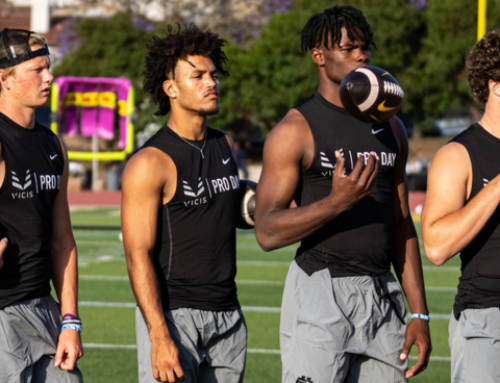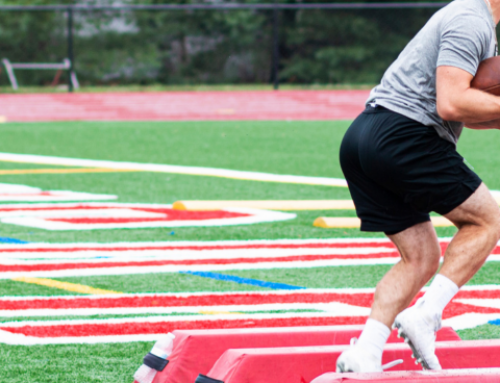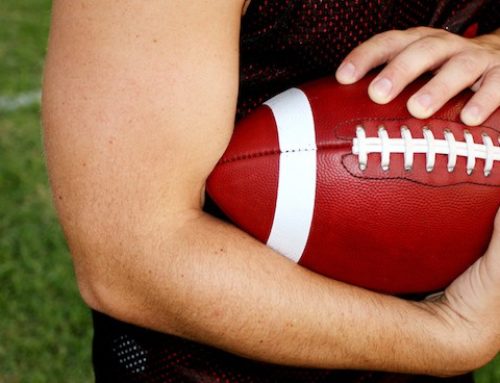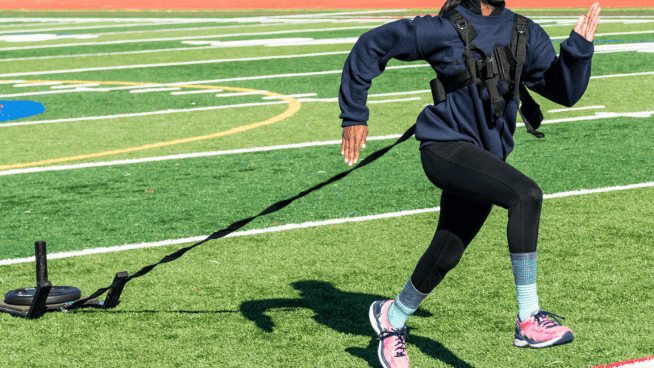How a Support Crew Named ‘The Dream Team’ Helped Houston Texans DB Treston Decoud Escape a Life of Violence and Make it to the NFL
Treston Decoud saw wasted potential. He saw families torn apart. He saw the impact of crime on friends and loved ones in his hometown of Covington, Louisiana, and he knew there was a better way.
“[I saw] a lot of friends go to jail for murder, killing, drugs, everything like that,” Decoud told STACK. “We decided to be positive people in our neighborhood to show kids there’s another way. Instead of going to jail, instead of dying, you can go to college, you can get a degree, you can help your family.”
That was the genesis of the “Dream Team,” a group of Covington-area kids who came together under a common banner. The goal? Stay on the straight and narrow, earn a college scholarship, and eventually make it to the NFL. The aspirations were high, so the group was tight-knit—only about 10 members. Treston is one of the elders of the group. If you want to know how serious he takes the commitment, just look at his left forearm. There the word “DREAMTEAM” is inked for eternity, etched into the New Orleans skyline:
“All of us got or had dreams of playing in college, dreams of playing in the NFL. It definitely means a lot to us. All of us got a tattoo. We take it really, really serious and we want our voice to be heard,” Decoud said. “We want people to know about Covington, Louisiana. It’s not just some bad place—it’s a great community, there’s great people there. We want people to know we’re coming for everything we want. It’s just hard for a lot of people to get out because they don’t know how to get out, you know? They see one thing and they think that’s the only way to get out. But no, that’s why the Dream Team is here. We’re here to show people, kids in the neighborhood, there’s a different way to get out.”
RELATED: Pita Taumoepenu’s Incredible Journey From Tongan Fruit Farmer to The NFL
Though getting an education is a top priority for the Dream Team members, most do indeed have aspirations to pursue careers in the NFL. Decoud and Otha Peters, a member of the Dream Team who played linebacker at UL-Lafayette and recently signed a UDFA contract with the Seattle Seahawks, are on the precipice of that goal.
Decoud’s journey to the NFL is a lesson in perseverance, focus and perspective. He was raised in Covington, a city about 40 miles north of New Orleans. Settled just off Lake Pontchartrain, the city has a sort of bayou beauty. But Decoud also remembers it as an area rife with drugs and wannabe gangsters.
“I love my city,” Decoud said. “There’s a lot of stuff going on that can distract you from your goal of trying to be successful, but I think that’s what made me who I am. You see guys go to jail, you see guys on the corner, doing stuff you’re not supposed to. But I never wanted that.” He recalls getting jumped by thugs frequently. One day, he finally fought back. After that, he walked the streets mostly undisturbed.
That didn’t necessarily make life easier, though. Treston’s mother, Chandrika, was a single parent who did whatever she could to provide for her only child. When she was diagnosed with breast cancer when Treston was still a boy, it shook up the family. She didn’t want her son to see her struggling through treatments, so he often spent nights at the house of a relative or family friend. The darkest days came when Chandrika and Treston lived together in a trailer as she battled cancer. Treston recalls going without lights or water for weeks at a time. Food was often scarce.
Sports became a safe haven. Treston often found himself participating in hard-nosed pick-up games around his neighborhood. “I always wanted to play football,” he said. “Growing up in the neighborhood, we used to play a game called ‘Sideline, Dead Man.’ There was green grass on one side, then the concrete road on the other. I didn’t want to get tackled in the road, because then you’d get tackled on concrete. Growing up playing with older guys in the neighborhood, it made me want to play football.”
It wasn’t until junior high that he got involved in an organized form of the sport. During his first practice at Hammond Junior High School, Decoud was quickly humbled. “I remember they put me on defense the first play. I tried to make a tackle and almost killed myself—I didn’t know the proper way to tackle. But that changed my life that day—it taught me how to be an athlete, how to properly use my head and my hands to make a tackle,” Decoud said.
Soon enough, Decoud was tearing it up as a two-sport star at Lakeshore High School. He was an outstanding sprinter, twice qualifying for the state track & field championships in the 200-meter dash and 400-meter dash. But it was on the football field where he really shined, earning all-district honors at four different positions over his high school career. Football also put him around players and people who shared a vision similar to his own—many of the same people who would eventually comprise the Dream Team.
“I think football made me who I am. Bringing these [good] people around me, I wouldn’t be the guy who had those type of friends or role models if I didn’t play football,” Decoud said.
Though he was a stellar athlete, Decoud had trouble fully applying himself in the classroom. In recruiting terms, he was a “non-qualifier”—a student who didn’t meet the core GPA or SAT/ACT scores needed to receive an athletic scholarship from the NCAA. Decoud’s best option was to attend Chadron State, a Division II school in Nebraska. Chandrika’s cancer had gone into remission, which helped Treston feel a bit better about his decision to leave home and head to a school 1,452 miles away.
After a redshirt year, Decoud played sparingly during his freshman season. But the experience of being away from home and on his own helped him get a better handle on his responsibilities. “I’m glad I went to Chadron State. I don’t regret nothing, I learned from my mistakes,” Decoud said. “I learned about myself.”
Then, adversity struck. Chandrika’s cancer suddenly returned. Decoud quickly transferred to Nicholls State in Louisiana so he could be close to her. Her illness ate away at him to the point where he debated walking away from football and college altogether, but Chandrika wasn’t having it. “I definitely talked to her about stepping away from the game. But she always told me, ‘Why? Don’t worry about me. God got me.’ When she said that, I believed in her and I believe in God. So I put my faith in him and kept working,” Decoud said.
He quickly figured out that a junior college might be the best place for him to develop his talents and continue to get his academics in order. Nearby Northwest Mississippi Community College was interested, but they didn’t have many open scholarships. Their staff told Decoud he’d have to earn his scholarship during preseason camp if he wanted his school paid for. That was good enough for Decoud, who knew he just needed a chance.
At Northwest Mississippi, Decoud’s combination of size, athleticism and technique helped him become one of the best JUCO players in the nation. The 6-foot-2, 205-pound cornerback was especially effective in press coverage. In his lone season at Northwest Mississippi, he recorded 38 tackles, 6 interceptions, 7 pass break-ups and 13 passes defensed. After the season, he was named a JUCO All-American.
[youtube video=”BrwoSxZoDhc”]Decoud also blossomed in the classroom, spending long nights with the team’s academic coordinator to ensure he could qualify for a scholarship from a D-I school. Decoud’s growth on the field and in the classroom earned him offers from programs like Fresno State, Houston, Utah State and Oregon State. “Once I went to JUCO and started getting big recognition, I started feeling good about myself. I always wanted that. I always thought I was one of the best players in the world. It really made me feel good and it made me grind harder,” Decoud said. He eventually committed to Oregon State to play out his two final seasons of college eligibility.
RELATED: Is JUCO Football Right For Me?
Decoud arrived in Beaverton with a clear mind. He finally had an opportunity to make a name for himself on the national stage, and he was excited to play in one of the most prolific passing conferences in the nation. “It wasn’t like, ‘oh, I made it.’ But more like ‘I’m finally here and now I can show the world what I got.’ In the Pac-12, you throw the ball a lot. You’re supposed to be the best athletes in the world in the Pac-12. That’s why I went there,” Decoud said.
Roughly around that time, Chandrika was declared cancer-free. “It was a relief—it was like getting a bear off my back,” Decoud said. “It was just a sigh of relief, knowing I could focus on my tasks. I was focused before, but now I could really focus on what I had to do to make her proud. That was definitely the biggest battle I ever had to fight against. Now, she’s one hundred percent healthy. It’s not a fight anymore, and I thank God for it.”
Decoud started nine games during his junior season at Oregon State, recording 50 tackles, 5 passes defended and 3.5 tackles for loss.
Shortly after his junior season, the team brought in Cory Hall as a cornerbacks coach. Hall played 87 games in the NFL as a defensive back, and Decoud found his knowledge invaluable.
“He’s a great coach and he taught me how to watch film, how to read plays, all that kind of stuff. He just taught me how to be a better football player with my mind. He told me the game is 95 percent mental. He helped me know what was coming, so I could play fast and react,” Decoud said. “I think preparation was big (for me) in 2016.”
As a senior, Decoud had his coming out party. He started all 12 games while recording 58 tackles, 10 pass breakups and two interceptions en route to Pac-12 All-Conference Honorable Mention.[youtube video=”OziLVLuXbxk”]
Perhaps his best game came against Cal wide receiver Chad Hansen, who went on to be named a first-team All-Pac-12 selection after racking up 1,249 receiving yards during the season. Decoud held him to 16 yards on four catches. “I think he was the best receiver in the Pac-12, that’s just my opinion. He’s a smart player, but I’m a savvy player. I talk trash, and I knew if I could get in his head, it would be over with. I had to put my big-boy pants on. I knew if I wanted to be in the NFL, I had to shut him down. It was a great battle,” Decoud said.
RELATED: Davis Webb’s Obsession With Preparation Has His Draft Stock Skyrocketing
Decoud’s prototypical size, strong production and impassioned play grabbed the attention of pro scouts. STACK interviewed him shortly before the NFL Draft, and he spoke like a player confident in his ability to succeed at the highest level.
“My pitch to an NFL team is to watch the film. I’m long, physical. I’m a press man corner. I’ve got three things they want—I can tackle, I can make plays on the ball and I can cover,” Decoud said. “I don’t care about the round [I go in] or anything like that. I just want the opportunity to show teams that I’m the best cornerback in the draft.” The Houston Texans gave him that opportunity when they selected him in the 5th round of the 2017 NFL Draft.
After a circuitous, arduous path to the NFL, Decoud isn’t planning on letting his opportunity slip away. “I’m ready to work, man. I want to prove to the world that I am who I say I am,” Decoud said. All the while, his biggest supporter will be there cheering him on. “My mama, she’s never changed. She’s always been my biggest fan, my biggest supporter. She’s my everything.”
Photo Credit: Brian Murphy/Icon SportsWire/Getty Images
RECOMMENDED FOR YOU
MOST POPULAR
How a Support Crew Named ‘The Dream Team’ Helped Houston Texans DB Treston Decoud Escape a Life of Violence and Make it to the NFL
Treston Decoud saw wasted potential. He saw families torn apart. He saw the impact of crime on friends and loved ones in his hometown of Covington, Louisiana, and he knew there was a better way.
“[I saw] a lot of friends go to jail for murder, killing, drugs, everything like that,” Decoud told STACK. “We decided to be positive people in our neighborhood to show kids there’s another way. Instead of going to jail, instead of dying, you can go to college, you can get a degree, you can help your family.”
That was the genesis of the “Dream Team,” a group of Covington-area kids who came together under a common banner. The goal? Stay on the straight and narrow, earn a college scholarship, and eventually make it to the NFL. The aspirations were high, so the group was tight-knit—only about 10 members. Treston is one of the elders of the group. If you want to know how serious he takes the commitment, just look at his left forearm. There the word “DREAMTEAM” is inked for eternity, etched into the New Orleans skyline:
“All of us got or had dreams of playing in college, dreams of playing in the NFL. It definitely means a lot to us. All of us got a tattoo. We take it really, really serious and we want our voice to be heard,” Decoud said. “We want people to know about Covington, Louisiana. It’s not just some bad place—it’s a great community, there’s great people there. We want people to know we’re coming for everything we want. It’s just hard for a lot of people to get out because they don’t know how to get out, you know? They see one thing and they think that’s the only way to get out. But no, that’s why the Dream Team is here. We’re here to show people, kids in the neighborhood, there’s a different way to get out.”
RELATED: Pita Taumoepenu’s Incredible Journey From Tongan Fruit Farmer to The NFL
Though getting an education is a top priority for the Dream Team members, most do indeed have aspirations to pursue careers in the NFL. Decoud and Otha Peters, a member of the Dream Team who played linebacker at UL-Lafayette and recently signed a UDFA contract with the Seattle Seahawks, are on the precipice of that goal.
Decoud’s journey to the NFL is a lesson in perseverance, focus and perspective. He was raised in Covington, a city about 40 miles north of New Orleans. Settled just off Lake Pontchartrain, the city has a sort of bayou beauty. But Decoud also remembers it as an area rife with drugs and wannabe gangsters.
“I love my city,” Decoud said. “There’s a lot of stuff going on that can distract you from your goal of trying to be successful, but I think that’s what made me who I am. You see guys go to jail, you see guys on the corner, doing stuff you’re not supposed to. But I never wanted that.” He recalls getting jumped by thugs frequently. One day, he finally fought back. After that, he walked the streets mostly undisturbed.
That didn’t necessarily make life easier, though. Treston’s mother, Chandrika, was a single parent who did whatever she could to provide for her only child. When she was diagnosed with breast cancer when Treston was still a boy, it shook up the family. She didn’t want her son to see her struggling through treatments, so he often spent nights at the house of a relative or family friend. The darkest days came when Chandrika and Treston lived together in a trailer as she battled cancer. Treston recalls going without lights or water for weeks at a time. Food was often scarce.
Sports became a safe haven. Treston often found himself participating in hard-nosed pick-up games around his neighborhood. “I always wanted to play football,” he said. “Growing up in the neighborhood, we used to play a game called ‘Sideline, Dead Man.’ There was green grass on one side, then the concrete road on the other. I didn’t want to get tackled in the road, because then you’d get tackled on concrete. Growing up playing with older guys in the neighborhood, it made me want to play football.”
It wasn’t until junior high that he got involved in an organized form of the sport. During his first practice at Hammond Junior High School, Decoud was quickly humbled. “I remember they put me on defense the first play. I tried to make a tackle and almost killed myself—I didn’t know the proper way to tackle. But that changed my life that day—it taught me how to be an athlete, how to properly use my head and my hands to make a tackle,” Decoud said.
Soon enough, Decoud was tearing it up as a two-sport star at Lakeshore High School. He was an outstanding sprinter, twice qualifying for the state track & field championships in the 200-meter dash and 400-meter dash. But it was on the football field where he really shined, earning all-district honors at four different positions over his high school career. Football also put him around players and people who shared a vision similar to his own—many of the same people who would eventually comprise the Dream Team.
“I think football made me who I am. Bringing these [good] people around me, I wouldn’t be the guy who had those type of friends or role models if I didn’t play football,” Decoud said.
Though he was a stellar athlete, Decoud had trouble fully applying himself in the classroom. In recruiting terms, he was a “non-qualifier”—a student who didn’t meet the core GPA or SAT/ACT scores needed to receive an athletic scholarship from the NCAA. Decoud’s best option was to attend Chadron State, a Division II school in Nebraska. Chandrika’s cancer had gone into remission, which helped Treston feel a bit better about his decision to leave home and head to a school 1,452 miles away.
After a redshirt year, Decoud played sparingly during his freshman season. But the experience of being away from home and on his own helped him get a better handle on his responsibilities. “I’m glad I went to Chadron State. I don’t regret nothing, I learned from my mistakes,” Decoud said. “I learned about myself.”
Then, adversity struck. Chandrika’s cancer suddenly returned. Decoud quickly transferred to Nicholls State in Louisiana so he could be close to her. Her illness ate away at him to the point where he debated walking away from football and college altogether, but Chandrika wasn’t having it. “I definitely talked to her about stepping away from the game. But she always told me, ‘Why? Don’t worry about me. God got me.’ When she said that, I believed in her and I believe in God. So I put my faith in him and kept working,” Decoud said.
He quickly figured out that a junior college might be the best place for him to develop his talents and continue to get his academics in order. Nearby Northwest Mississippi Community College was interested, but they didn’t have many open scholarships. Their staff told Decoud he’d have to earn his scholarship during preseason camp if he wanted his school paid for. That was good enough for Decoud, who knew he just needed a chance.
At Northwest Mississippi, Decoud’s combination of size, athleticism and technique helped him become one of the best JUCO players in the nation. The 6-foot-2, 205-pound cornerback was especially effective in press coverage. In his lone season at Northwest Mississippi, he recorded 38 tackles, 6 interceptions, 7 pass break-ups and 13 passes defensed. After the season, he was named a JUCO All-American.
Decoud also blossomed in the classroom, spending long nights with the team’s academic coordinator to ensure he could qualify for a scholarship from a D-I school. Decoud’s growth on the field and in the classroom earned him offers from programs like Fresno State, Houston, Utah State and Oregon State. “Once I went to JUCO and started getting big recognition, I started feeling good about myself. I always wanted that. I always thought I was one of the best players in the world. It really made me feel good and it made me grind harder,” Decoud said. He eventually committed to Oregon State to play out his two final seasons of college eligibility.
RELATED: Is JUCO Football Right For Me?
Decoud arrived in Beaverton with a clear mind. He finally had an opportunity to make a name for himself on the national stage, and he was excited to play in one of the most prolific passing conferences in the nation. “It wasn’t like, ‘oh, I made it.’ But more like ‘I’m finally here and now I can show the world what I got.’ In the Pac-12, you throw the ball a lot. You’re supposed to be the best athletes in the world in the Pac-12. That’s why I went there,” Decoud said.
Roughly around that time, Chandrika was declared cancer-free. “It was a relief—it was like getting a bear off my back,” Decoud said. “It was just a sigh of relief, knowing I could focus on my tasks. I was focused before, but now I could really focus on what I had to do to make her proud. That was definitely the biggest battle I ever had to fight against. Now, she’s one hundred percent healthy. It’s not a fight anymore, and I thank God for it.”
Decoud started nine games during his junior season at Oregon State, recording 50 tackles, 5 passes defended and 3.5 tackles for loss.
Shortly after his junior season, the team brought in Cory Hall as a cornerbacks coach. Hall played 87 games in the NFL as a defensive back, and Decoud found his knowledge invaluable.
“He’s a great coach and he taught me how to watch film, how to read plays, all that kind of stuff. He just taught me how to be a better football player with my mind. He told me the game is 95 percent mental. He helped me know what was coming, so I could play fast and react,” Decoud said. “I think preparation was big (for me) in 2016.”
As a senior, Decoud had his coming out party. He started all 12 games while recording 58 tackles, 10 pass breakups and two interceptions en route to Pac-12 All-Conference Honorable Mention.[youtube video=”OziLVLuXbxk”]
Perhaps his best game came against Cal wide receiver Chad Hansen, who went on to be named a first-team All-Pac-12 selection after racking up 1,249 receiving yards during the season. Decoud held him to 16 yards on four catches. “I think he was the best receiver in the Pac-12, that’s just my opinion. He’s a smart player, but I’m a savvy player. I talk trash, and I knew if I could get in his head, it would be over with. I had to put my big-boy pants on. I knew if I wanted to be in the NFL, I had to shut him down. It was a great battle,” Decoud said.
RELATED: Davis Webb’s Obsession With Preparation Has His Draft Stock Skyrocketing
Decoud’s prototypical size, strong production and impassioned play grabbed the attention of pro scouts. STACK interviewed him shortly before the NFL Draft, and he spoke like a player confident in his ability to succeed at the highest level.
“My pitch to an NFL team is to watch the film. I’m long, physical. I’m a press man corner. I’ve got three things they want—I can tackle, I can make plays on the ball and I can cover,” Decoud said. “I don’t care about the round [I go in] or anything like that. I just want the opportunity to show teams that I’m the best cornerback in the draft.” The Houston Texans gave him that opportunity when they selected him in the 5th round of the 2017 NFL Draft.
After a circuitous, arduous path to the NFL, Decoud isn’t planning on letting his opportunity slip away. “I’m ready to work, man. I want to prove to the world that I am who I say I am,” Decoud said. All the while, his biggest supporter will be there cheering him on. “My mama, she’s never changed. She’s always been my biggest fan, my biggest supporter. She’s my everything.”
Photo Credit: Brian Murphy/Icon SportsWire/Getty Images














